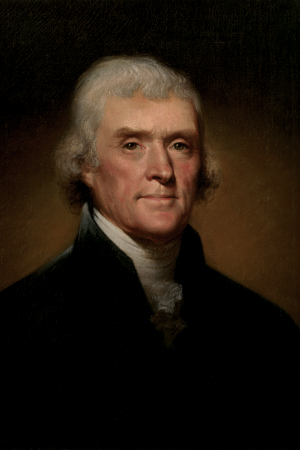More specifically, Jefferson felt that we all share equally a common humanity in that we have a capacity for, and possess, a moral sense (Padover 1943, 1032–34). In a letter to his young friend Peter Carr, Jefferson wrote:
He who made us would have been a pitiful bungler, if he had made the rules of our conduct a matter of science. For one man of science, there are a thousand who are not. What would have become of them? Man was destined for society. His morality, therefore, was to be formed to this object. He was endowed with a sense of right and wrong merely relative to this. This sense is as much a part of his nature, as the sense of hearing, seeing, feeling; it is the true foundation of morality.... The moral sense, or conscience, is as much a part of man as his leg or his arm. It is given to all human beings in a stronger or weaker degree.... It may be strengthened by exercise, as may any particular limb of the body. This sense is submitted, indeed in some degree, to the guidance of reason; butit is a small stock which is required for this; even a less one that what we call Common sense. State a moral case to a ploughman and a professor. The former will decide it as well, and often better than the latter, because he has not been led astray by artificial rules. (Peterson 1977, 424)Jefferson’s respect for the moral agency of others was indeed an affirmation of his own humanity, a self-affirmation. Concerning women he wrote, “It is civilization alone which replaces women in the enjoyment of their natural equity. That first teaches us to subdue the selfish passions, and to respect those rights in others that we respect in ourselves” (Jefferson [1785] 1972, 60). Jefferson was opposed to religious, political, and social tyranny; thus, equality for him was also a matter of self-assertion. His method of dealing with the will to power of human beings was to invert it to a will to resist the despotism and tyranny of others. In a letter to the physician Benjamin Rush he wrote, “I have sworn upon the altar of God, eternal hostility against every form of tyranny over the mind of men” (Bartlett 1968, 472).
Slavery was the tragic flaw in the founding of American government. Jefferson was a slaveholder and this cannot be dismissed as only a concession to the society in which he lived. It was in his own self-interest and it allowed him to live an aristocratic lifestyle. He thus contributed to this tragedy. Yet, he understood the moral bankruptcy of slavery, its moral incompatibility with democratic government, and the need for its eventual abolition.
Jefferson felt that slavery could not be immediately abolished without the threat of great violence because of past injustices to blacks and the deeply held prejudices of whites. He had unsuccessfully recommended laws which would have achieved gradual but total emancipation, colonization of gradually emancipated slaves, and exclusion of slavery from all Western Territories (see also Jefferson [1785] 1972, 214). His diatribe against the king for allowing slavery to become established in the colonies was omitted from the final draft of the Declaration of Independence. At the time of the Missouri Compromise of 1820, he described the threat of the slavery issue to the Union as a “firebell in the night,” and he wrote, “we have a wolf by the ears, and we can neither hold him, nor safely let him go. Justice is in the one scale, and self-preservation in the other” (Peterson 1977, 568). More than thirty years earlier he had written, “I tremble for my country when I reflect that God is just; that his justice cannot sleep forever...” (Jefferson [1785] 1972, 163).
Jefferson’s proposal to abolish slavery after 1800 in all territories and future territories was defeated in committee by one vote. Concerning this he later commented: “Thus we see the fate of millions of unborn hanging on the tongue of one man, and heaven was silent in that awful moment” (Kenyon 1980). Jefferson understood the moral dimensions of freedom and he put them forth in stating the ideals of a new nation. In practice, the Civil War with the loss of over 600,000 lives and several constitutional amendments were necessary to both preserve the Union and make universal equality as a principle and as the basis of the democratic process something toward a reality.
Complete Essay with references from my book, Moral and Political Philosophy.
James Ruthereford, M.D.

